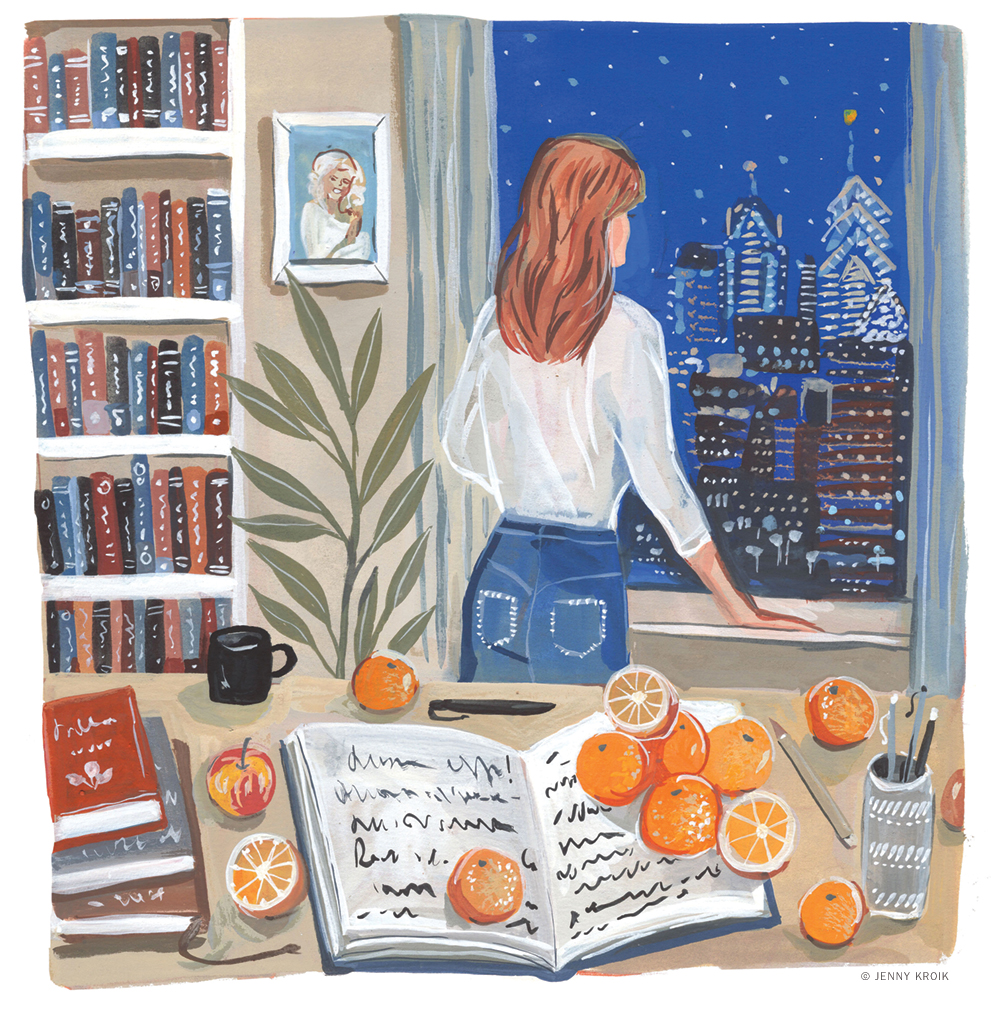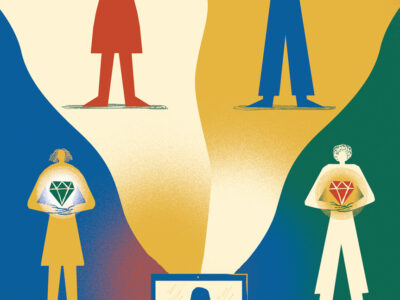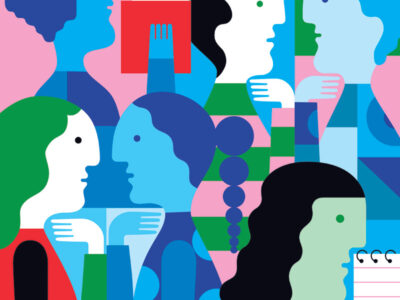
A care package.
By Lila Dubois
A month into my freshman year of college, my mom mailed me six oranges. When I called to thank her, she apologized for not sending more, explaining how she’d whittled down, orange after orange, until the postal scale matched her shipping budget. How the 15 she’d picked in the front yard that morning became the six sitting in a small cardboard box on my desk. I just wanted you to have some, because the oranges out there are not as good as ours.
With my cheek pressed tight to the glass of my phone, I thanked her. Yes, I will share with my roommate, I told her, and Yes, I love you too. Then I hung up. I imagined her driving home, nine extraneous oranges rolling around the floor of her backseat. Sacred fruit.
I grew up in the San Fernando Valley, that seemingly endless stretch of suburbia that dissipates at the furthest edges into the yellow brush of the Santa Clarita and the Santa Monica mountains. A wasteland of freeways and strip malls, of dripping purple nights and summers hot enough to fry eggs on windshields (which we did). Years ago, this far northwestern swath of Los Angeles County was almost entirely orange groves, interspersed with a scattering of ranches, oak and walnut trees, and wild coyote mint. Although the ranches have mostly turned to residential housing, orange trees still abound. In my neighborhood they grow up through lawns and sidewalks, and porches are built accommodatingly around their trunks. Pulp smears into the crags of the road and clogs the tire treads of speeding cars. In mid-spring, the smell of their blossoms radiates into the night, calling neighbors to slurp fudgesicles on stoops after dinner and sleep with the windows open. This scent, I’ve always believed, must be embedded into the collective psyche of all Valley natives. This was where my mom grew up. This was where she raised my sister and me.
We picked the oranges from our trees—the one in the backyard, the two in the front. Also from our neighbors’ yards, or from the tree on the corner, between the Wells Fargo bank and orthodox synagogue. My sister and I would run home with our shirts folded up, cotton pouches stretched tight around precious orange cargo. Our quarry would cover the counter, overflowing from bowls and rolling loose off the edge. Back then I understood our kitchen primarily as a vessel for the fruit it could house. In especially good seasons, the storage expanded to our garage, whose walls we lined with brown paper grocery bags of citrus overflow. It seemed the possibilities of the orange were infinite. It could become a popsicle. A marinade for my dad’s barbecue. A grace note in any number of my mother’s creations: olive oil cakes, ginger cookies, a yellow rice pilaf, walnut spinach salads, lemon sorbets. It was a meal in and of itself, served best with a dollop of yogurt or a pinch of cinnamon. An orange was a gift, something we brought to friends, to housewarming and birthday parties, or a neighbor’s First Communion.
In my family it was a peace offering too. We made apologies through carefully peeled pieces of fruit, segments separated and offered fanned out on a paper towel. Sharing the last bite meant forgiveness.
Back then I took this all as a fact of life. I peeled and ate and sliced and gorged without reverence or consideration beyond that of my immediate hunger. Out of habit. Out of convenience. Thoughtlessly. Out on the stoop, the brick still warm. Alone with my sister, the orange juice running down our arms, dripping to the ground, and christening our home at the intersection of Quedo and Poe as our own sort of citrus church.
I took more notice as a teenager, as I sensed California becoming more temporary, fading with the growing notion that I would soon leave. I would go East, fresh out of high school and drunk on the reverse pioneer spirit that sometimes afflicts the youth of the West. For those born by the Pacific, for whom California’s magical golden haze is just a marine layer, the East represents something fantastically new. I envisioned traceable skylines and stumbling down dim alleyways towards pulsing basement music and the secret sensuality of getting caught in an unexpected rain. I was one of those young, naïve, and unaware fledglings who lust for something unknown only because they have not yet realized they have been quite happy most of their life. Those who are unsatisfied because they do not understand winters without sun, or realize that the horizon is not only distant sagebrush-etched hills, but can also be a low, flat, unending line. I was going East because I didn’t know what I wanted. I just knew that I hadn’t found it in some striking way where I was.
But when I landed in Philadelphia for college—my dad’s Dolly Parton playlist all played through and my bangs clinging to my forehead in the humidity—the truth asserted itself. I was no reverse pioneer. I was a stranger here. Someone without friends or family or a familiar street name with which to situate myself. No San Feliciano or Tujunga or Mulholland. Now it was Walnut and Spruce, Baltimore and Market. I fumbled my way around campus, was late to class, and missed assignments I didn’t know I had. I got rejected from sororities, literary magazines, the spoken word poetry group. Essays that had earned me praise in high school were turned down by every campus publication I submitted to. In the dining hall I ate with headphones on, Dolly Parton at full volume, thinking of home. I ate the dining hall cantaloupe and felt sick, its sweetness nauseating. I missed fruit that bit back, fruit with a tangy sort of fight. I thought of the empty box on my desk. I left dinner with a dull pulsing glucose headache.
But slowly, inevitably, my feeling of presence in Philadelphia eclipsed the distance from California. It happened sometime between the day I walked to the pharmacy without directions and the day my poetry professor remembered my name: I began to think of Locust Street as my shipping address. I found myself each night in the cafeteria with a group of loud and laughing and smart new people. We complained about stale fries and still got seconds and thirds—and suddenly I realized we must be friends. I fell in love in the city, got a SEPTA card, ate a halal truck cheesesteak. I saw Rittenhouse Michael Jackson like an apparition in the Center City morning dew. And maybe it was that, or all of these things at once, but eventually the new city became something I recognized, something I started to know. Something I could call a home.
And Philly, as it turns out, has very good apples. Actually, the fourth best in the country, according to an orchard vendor at the Clark Park farmers market. And I liked apples. I could get behind apples. The stunning white oblivion of the first bite. The shocking brilliance of its sweet flesh and bitter skin. A fruit so good that it made me realize that there were oranges everywhere, though those oranges may be apples. Or mangos or raspberries or plums, I suppose: reasons to love and attach to new places. Ways to find new homes.
In some glimmering, far-off future, I imagine myself in a totally new place. There on my desk sits a small cardboard box of apples. Honeycrisp, the kind from Clark Park on a Saturday morning. Sent by a friend in Philly. I will call my friend to say there’s nothing like them out here, thank you, hang up and take that first seersucker crunch. I will chew heartily, savor the sugary meat completely, and look out the window over a city full of people and street names I do not yet know. I will think to myself how lucky I am to have tasted a fruit so delicious I could miss it this much. How lucky to have been sent a package by a friend. To be reminded of Philadelphia. Or that an orange could taste forever of my mom and sister and dad and our citrus-church stoop. How lucky to have lived something worthy of missing.
Lila Dubois is a College sophomore from California’s San Fernando Valley.





A beautiful article. Thank you for sharing.
Wow!!
This is so beautifully written.
I loved this article. I had precisely the reverse experience moving from my home town of Philadelphia to the San Francisco Bay Area. I lost my beloved Jersey Tomatoes and Amoroso Bread; finding a good tomato out here is nigh impossible, and bread just is not the same.
However, I was rewarded with avocados, stellar Mexican food, and a whole array of glorious new experiences I would lose should I return to Philadelphia.
My son took the same path as you, reverse pioneering to Boston despite my efforts to flee west. He likes snow. Go figure.
This is so beautiful! – a fellow LA native
wowza!!!
Absolutely beautiful.